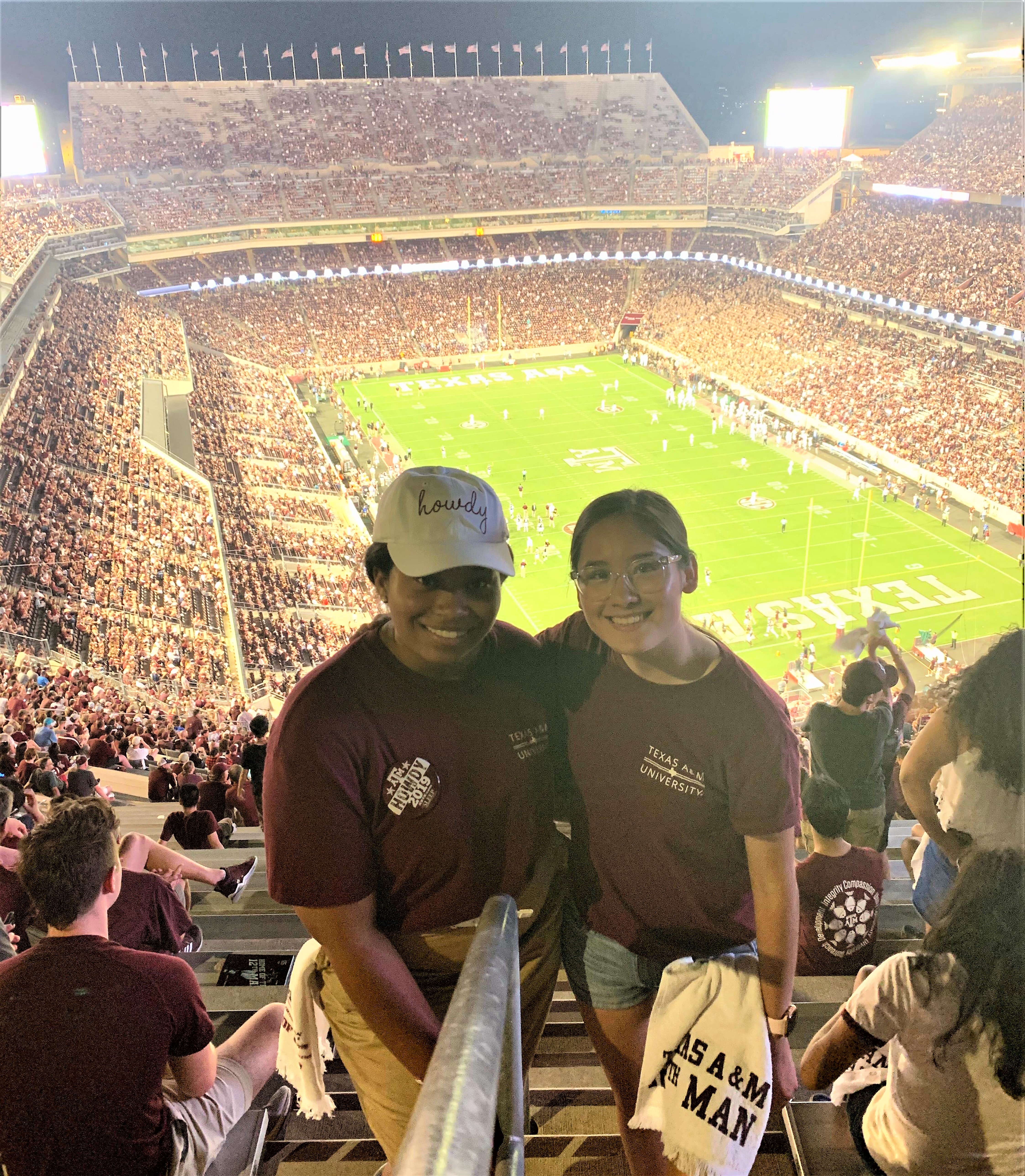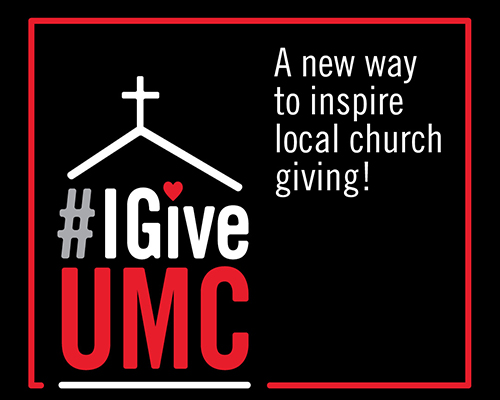Without a hint of overstatement, Angie** says mentoring changed her life.
The young woman, now a sophomore at Texas A&M University at College Station, credits her self-confidence and success so far with what she learned about navigating both school and life during her 10 years as a part of a mentoring ministry at First United Methodist Church at Fort Worth, Texas.

Angie, right, credits mentoring with giving her the self-confidence to achieve her goals. She and a friend (left) are pictured at a football game at Texas A&M University at College Station, where Angie was awarded a scholarship to attend. Photo courtesy of Gay Ingram.
“I think mentoring made Angie feel cherished. She knew when I came to her school I was there just for her,” recalls Karen Hunt, a member of First United Methodist Church at Fort Worth and Angie’s elementary school mentor. However, she added, the young girl wasn’t the only one who benefited from the relationship. “Angie gave me hope in my ability to make an impact in the community. I saw how a small gesture on my part could make a big difference in her life.”
For the past 15 years, the Kids Hope USA Mentoring program at First United Methodist Church at Fort Worth has worked with students at nearby elementary schools. The ministry’s slogan is “one child, one hour, one church, one school at a time.” Last school year, more than 60 church members signed up. Throughout the duration of the ministry, an average of 95 percent of the volunteers commit to more than one year, says Gay Ingram, the church’s Kids Hope director.
“There is not one child who would not benefit from having a mentor,” says Ingram, a retired school principal and educator. “But it’s a two-way street. If you were to call our volunteers and ask their impressions, I am certain 99 percent will tell you that they get more from their experiences than the children. They really feel that way.”
Hunt says mentoring was a way for her to live out her faith “by making a selfless commitment to a child,” an action that came with exponential rewards. “It’s amazing to witness the transformation that comes from spending one hour a week with a student.”
Angie recently wrote a letter to the church and Kids Hope volunteers. “Kids Hope definitely shaped me and helped me become the person I am today,” she wrote, adding “Mrs. Karen definitely changed my life.” She also credits her middle school mentor, Mrs. Paula, with teaching her to “trust and believe in herself … so that I could achieve anything that I wanted in life.”
Mentoring is caring
“This ministry is simply caring about your neighbors, caring about a child’s well-being, education and serving as a Christian example to those you come in contact with,” Ingram explains.
There are parameters, of course. “We do not mention our faith, we do not pray with the children, read scripture or talk about anything biblically-related," she says. "We try to be the Hands and Feet of Jesus, by example.
Make no mistake, however. Kids Hope is a faith-based program. Each mentor is paired with a prayer partner, the church’s United Methodist Women and Sunday School classes donate items, such as school supplies, and, this summer, the Kids Hope fund purchased groceries for the mentees’ families. In the past, the children have been invited to Vacation Bible School and all extracurricular events, such as Christmas parties, take place at the church.
The First United Methodist Church at Fort Worth program is modeled after a national organization of the same name. Ingram raves about Kids Hope, but emphasizes the success of their program is less about affiliation with a specific organization and more about the church members involved.

We invite you to join us in the #IGiveUMC celebrations scheduled through the year, a giving campaign for your local church. The current giving focus is for teachers and educators. If you have been inspired by a teacher or educator in your life, you may consider expressing appreciation by making a gift to a local United Methodist Church in their honor. All #IGiveUMC dollars collected will stay within the church to help them provide for their ministries.
“It’s the volunteers who step up every day to serve these children that make the difference,” says Ingram. “Mentoring is being a faithful friend to a child who needs extra support and who needs uplifting and encouragement. We do not consider ourselves counselors or fixers,” Ingram clarifies. “We can’t fix their issues or their concerns but we can brighten their day to be a good example and we can help them make better decisions.”
Making the distinction between counselor and mentor is important at College Avenue United Methodist Church’s Campus Mentoring Ministry, as well. The church, located two blocks from Ball State University in Muncie, Indiana, focuses on the intersection of vocation and faith for its ministry. Started five years ago, thanks to a sustainability grant from the Lilly Endowment, the church pairs students with church members whose careers match the students’ fields of study.
Intersection of faith and job
"Our ministry is not us telling students what they need to be doing," says Chris Mahon, intergenerational minister at College Avenue United Methodist Church. "We are walking alongside them. We are offering our experiences, our faith."
Rachel Shockney, a student at Ball State University, discussed with her mentor, John Ledbetter, what it might look like to incorporate her faith into her future business career.
“He explained that when you’re one-on-one with a client, that’s an opportunity to show your faith,” she shares, adding that they also discussed the importance of making time for personal praying and other faith practices.
“In this program, the whole point of the relationship is to facilitate Rachel’s growth in her faith,” says Ledbetter, who is an associate professor of accounting at Ball State University and a member at College Avenue United Methodist Church. His role as a mentor, he says, is not to be a teacher or to be someone who has all of the answers. “I’m really to be a facilitator for her, a resource for her, specifically about faith.
“And,” he adds, “we talk a lot about life.”
Crystal Caviness works for UMC.org at United Methodist Communications. Contact her by email.
** Last names of mentees are not disclosed.
This story was published August 12, 2020.







